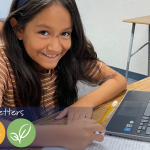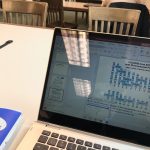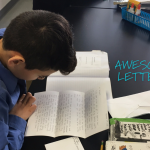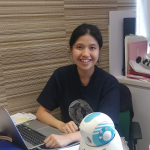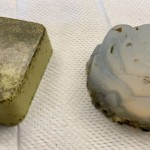by Amy Nusbaum
As a 17-year-old college freshman away from home for the first time, I was about as wide-eyed as they come. By some stroke of luck, I found myself in a unique research lab (https://www.hhmi.org/developing-scientists/science-education-alliance), designed to engage underclassmen in the research process. I was in awe. But, I also had an intense and overwhelming feeling that I simply did not belong there. After my first day of lab, I wrote, “Being in a college-level science lab threw me for a bit of a loop. I was slightly overwhelmed and worried when I saw all of the equipment we’d be using (on the first day), and nervous that I would be totally clueless.” I am now a third-year doctoral student with a BS and an MS, multiple publications, and a strong support network – but, those feelings have never quite gone away.
There were and are a lot of factors driving those feelings. Feeling like an “imposter” is certainly not a phenomenon that is unique to me – “imposter syndrome” is unfortunately common within higher education. However, in looking back at that time, my status as a first-generation college student was the marker that seemed to scream, “OUTSIDER!”
I came to college as the valedictorian of a 48-person graduating high school class. I was a National Merit Semi-Finalist, an FBLA national qualifier, and a decent athlete. By all measures, I was set up to be a quality college student. But, I was also from a small town and neither of my parents had bachelor’s degrees at the time I left for school (my mom has since earned a master’s degree – go UA Wildcats!). While I always knew I would go to college, the culture of university-going was not one that I was familiar with.
This lack of familiarity meant that some of the typical problems faced by college students were amplified for me as a freshman (and beyond). I had no idea how to handle class issues with the Registrar’s office – nor did I even know what the Registrar was. I did not utilize office hours – not because I would not have benefited from doing so, but because I didn’t realize what those listed times on my syllabus meant (we won’t even get into how complicated syllabi are). One of the most salient confusions for me was how on earth my professors could possibly be doctors, on top of being experts in fields like history and chemistry – I didn’t know that there was a way to earn a doctoral degree that wasn’t an MD. On their own, each of these problems might seem silly and minor. Together, they contributed to me almost losing my scholarship in my first year on campus and perpetually feeling like I should have never left home.
As much as it felt true at the time, my experiences are not unique. First generation students tend to complete fewer credits per year and have lower grades, in addition to working more hours than their peers (Pascarella et al., 2004). First generation students are less likely than their peers to interact with faculty members in the classroom or communicate with them frequently (Kim & Sax, 2009). Altogether, these gaps lead to lower first year retention rates of first gen students (Pratt et al., 2017).
Despite my struggles, I was a lucky first gen student and made it through. I found mentors early on who were generous with their time, care, and knowledge (shout out to Dr. Julie Stanton and others). I had a strong academic background. I wasn’t simultaneously having to deal with issues of oppression related to my race or sexual/gender identity and did not have to worry about where I would get my next meal. I am lucky that my battles were solely with the structure of academia. Still, those battles taught me a lot about what it means to be an outsider in a system that wasn’t built for me to succeed.
I try to apply those lessons to the students, research assistants, and mentees I now have the pleasure of working with. Here are a few things I’ve learned, both from my experiences and theirs:
- As scientists, take what you know about communicating your work to the general public and apply it to your students. When you present research to the public, you use less jargon and more examples – not because your audience is unintelligent, but because they aren’t content experts. Use those strategies when explaining the university to your students. Don’t assume they’re unintelligent or unprepared, merely recognize that they’re new to this neighborhood that you bought a house in years ago.
- Remind them that failure is common, particularly as you progress further into higher education. As scientists, we often do not do a great job of explaining to “outsiders” just how science works – how integral failing is to success. I typically insert a story about my first (AWFUL) chemistry exam after I post the grades for the first exam of any semester. Students of all stripes need a reminder that instances of failure don’t mean that they are failures.
- If you are first gen (or know other people in your department who are and are comfortable with it), identify! As with any underrepresented group, first gen students need to see that people who have backgrounds like them are valued and capable of being successful in whatever field they are in (Stephens et al., 2015).
- Expand what the word mentor means to you. Within the scientific hierarchy, this is typically a term that translates to “helping another person do science.” Advocate for your first gen students to apply for/get accepted to research programs – we actually benefit more from those than our peers (Hanauer, 2017). Recognize that while not always, first gen can also translate to low income, so be prepared to give information on resources such as local food banks and emergency loans for when financial aid comes in late.
- Be kind! It costs you nothing. When setting deadlines and late policies, consider your students who are working over 20 hours per week to be in school. If a student doesn’t know a word on an exam (that isn’t a course vocab word), give them a synonym. When a student sends an email that doesn’t fit your ideals for professionalism, assume a lack of knowledge and not malice – correct it, but gently. I once got a comment from a student that my gentle response to handling accommodations for them was the difference between staying at our university or dropping out. You simply never know what your students are dealing with, and kindness is rarely wrong.
As with most strategies designed to help disadvantaged groups, these strategies are useful to all your students. College can be confusing even for those who are fourth generation legacies at Harvard, and every one of your students could use a bit more kindness and compassion. Your first gen students are passionate, hard-working, and incredible – we sometimes just need a friendly face to remind us that we belong.
References
Hanauer, D. I., Graham, M. J., Sea-Phages, Betancur, L., Bobrownicki, A., Cresawn, S. G., … Hatfull, G. F. (2017). An inclusive Research Education Community (iREC): Impact of the SEA-PHAGES program on research outcomes and student learning. Proceedings of the National Academy of Sciences, 201718188. https://doi.org/10.1073/pnas.1718188115
Kim, Y. K., & Sax, L. J. (2009). Student–Faculty Interaction in Research Universities: Differences by Student Gender, Race, Social Class, and First-Generation Status. Research in Higher Education, 50(5), 437–459. https://doi.org/10.1007/s11162-009-9127-x
Pascarella, E. T., Pierson, C. T., Wolniak, G. C., & Terenzini, P. T. (2004). First-Generation College Students. Journal of Higher Education, 75(3), 249–284.
Pratt, I. S., Harwood, H. B., Cavazos, J. T., & Ditzfeld, C. P. (2017). Should I Stay or Should I Go? Retention in First-Generation College Students. Journal of College Student Retention: Research, Theory & Practice. https://doi.org/10.1177/1521025117690868
Stephens, N. M., Brannon, T. N., Markus, H. R., & Nelson, J. E. (2015). Feeling at Home in College: Fortifying School‐Relevant Selves to Reduce Social Class Disparities in Higher Education. Social Issues and Policy Review, 9(1), 1–24. https://doi.org/10.1111/sipr.12008
You can learn more about Amy by reading her Scientist Spotlight.

